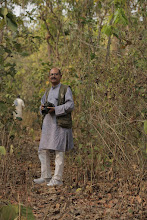But it was chiefly because of some retrogressive action of the Congress government like the decision to nullify the Supreme Court's judgment on the Shah Bano case through an ordinance and Prime Minister Rajiv Gandhi's move to throw open the Babri mosque for the devotees of Lord Ram, that gave a shot in the arm to communal elements among both the Hindus and Muslims.
It was Prime Minister V P Singh's decision to implement the recommendation of the Mandal commission on socially and economically backward classes that hastened the BJP to take up the issue of Ramjanmabhoomi temple in Ayodhya, lest the coming together of all the depressed classes - harijans, advisasis, other backward classes (OBCs) becomes a formidable obstacle to the Sangh Parivar's dream of turning India into a Hindurashtra.
The Sangh Parivar systematically went about recruiting and mobilizing harijans, adivasis and members of other backward classes for the Ramajanmabhoomi campaign. Through the campaign, the Sangh Parivar managed to 'sanskritize' and bring under the fold of Hindutva members of those communities who had been suffering the humiliation of untouchability for centuries. When the bricks meant for the construction of the Ram temple in Ayodhya were consecrated in a Dalit colony or a slum, those who participated in the ceremony felt equal to the caste Hindus.
Simultaneously, the Ramjanmabhoomi campaign portrayed the Muslims as 'enemies' of the country who had no place in the Hindurashtra. The Indian Constitution had rejected the two-nation theory by adopting secularism. Hence, what could not be achieved through constitutional means, the Sangh Parivar sought to achieve through unconstitutional and extra-parliamentary means by driving a communal wedge in the Indian society.
Polarization of society on communal lines has vastly benefited the BJP as is evident from the increasing strength of its members in both the Parliament and the various state assemblies. The communal carnage, which triggered off the ghastly memories of Nazi concentration camps, that shattered Gujarat between February and April 2002, was translated into a mandate for chief minister Narendra Modi to rule the state for yet another five years.
The Gujarat assembly election results porten a serious threat to the secular India because the BJP and its extra-parliamentary allies, the VHP, the Bajrang Dal and the RSS, have made it amply clear that they will be trying out the 'Gujarat Experiment' in the elections to the assemblies of six states later this year as also in the parliamentary general elections the next year.
Thursday, November 22, 2007
Saffron Surge
Subscribe to:
Post Comments (Atom)

No comments:
Post a Comment